Global Issues



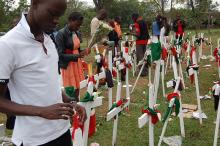
Faced with a fierce enemy driven by Muslim extremist ideology, the government has cracked down on funding for al-Shabab, the Somali group that claimed responsibility for killing 148 mostly Christian students at Garissa University College a week ago.
This week, Kenya froze the accounts of 85 groups and individuals, including bus companies and Muslim rights organizations, allegedly linked to the group. It has closed down one hotel in Eastleigh, a neighborhood in the Nairobi commonly known as Little Mogadishu because of its large concentration of ethnic Somalis.
But the freeze on Muslims for Human Rights and Haki Africa, two nongovernmental organizations, raised questions, since they are known for their work on improving the lives of Kenyans and fighting for human rights of all citizens.
“I am amazed that these human rights organizations are believed to have been supporting terror,” said Sheikh Juma Ngao, the national chairman of the Kenya Muslim National Advisory Council.
“I think the government needs to provide some evidence.”


There’s an old adage in journalism that if it bleeds, it leads. It sounds kind of savage and it’s often that principle people quip when complaining about excessive violence in the news.
That criticism isn’t wrong. Just watch 10 minutes of nightly news, and you’ll probably see nothing but murders and robberies, as if that’s the only thing that happens on a daily basis.
But what I think we forget when criticizing the bleed/lead principle is the inherent value it places on human life. The way I learned it in journalism school, “if it bleeds, it leads” means that people matter. It means that the loss of human life should never be something we consider a banality and that if there’s bloodshed, we, as journalists, have an obligation to report it.
In a perfect world, that would work. (Well, actually, in a perfect world, there would be no bloodshed for journalists to report, but you know what I mean.) But the problem that Gareth Higgins identifies in “A Newsfeed of Fear” (Sojourners, May 2015) is not so much the excessive coverage of suffering, but the callous coverage of it.
Instead of promoting the sanctity of life as I think it was originally intended, media coverage of crime and violence has been twisted into a formulaic script that serves only to create the must-watch, must-read news that brings in advertising dollars. And it can be hard to stomach that much disingenuousness.
Yet the solution is not a positive-news only model. There are media outlets — largely Christian ones — trying this, but I don’t think this approach adequately addresses what’s wrong with the mainstream media. For one thing, it does nothing to fix the problem of formulaic, disingenuous stories. People can fake happiness, too, you know. Furthermore, there are times when we actually need more bad news — like, for example, when black women disappear or when migrant farmworkers are being abused.
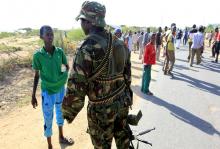
Somalia’s al-Shabab militants shot and killed more than 147 people, wounded dozens of others and held hundreds hostage April 2 at Garissa University College in northeastern Kenya.
Five hundred of the hostages were reportedly rescued as the day went on, but it was unclear immediately whether the standoff had ended and exactly what the death and injury toll was.
The gunmen reportedly arrived at the university at 5:30 a.m., killed the guards at the gate and began shooting indiscriminately before taking hundreds of students hostage. The Kenyan military tried to end the siege and rescued hundreds of the hostages during a shootout.
Most of the hostages are believed to be Christians.

CANADIAN MINING companies have left a trail of destruction around the world—mostly in places where people are poor and vulnerable.
The earliest conflicts caused by Canadian mining exploded in Guatemala in the early 1960s when the nickel company Inco dug into the northern mountainside of Guatemala’s largest freshwater lake, Lago Izabal. Almost 155 square miles of traditional Kekchi-Maya land was expropriated to create Inco’s Exmibal mine. As the region descended into bitter war, Guatemalan oligarchs and their military, with the support of Canadian-mining and U.S. geopolitical interests, exterminated all popular dissent. Dozens of Kekchi leaders were killed or disappeared; four prominent leaders who had published a report condemning the Inco-Exmibal deals were brutally assaulted and two of them assassinated. The Exmibal mine operated for three years before Inco abandoned it, never paying a nickel in royalties to Guatemala


Memories of Boko Haram’s murderous spree in his Nigerian hometown haunt Tom Gowon, 9, as he sits on a patch of grass at a refugee camp, sipping steaming porridge from a plastic mug.
“I was lucky because I was not killed,” said Gowon, recalling the assault on Baga, Nigeria, in early January.
“But they shot and killed my father. My mother was kidnapped by the militants.”
Children such as Gowon bear the brunt of Boko Haram’s rampage since its fighters kidnapped more than 200 schoolgirls last year and conquered enough territory to declare a caliphate that covers one-fifth of Nigeria.
Where the militants have met resistance, they’ve torched villages and left piles of corpses in their wake.
“There are several camps around here housing many children who have lost their parents in attacks,” said Guy Nanhousngue, a Chadian relief worker who said children make up about half of the Nigerians coming to the Baga Sola refugee camp on the shores of Lake Chad, which separates the two countries.
“We’re registering more than 50 children every day.”
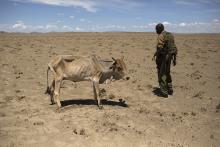
Drying livestock carcasses and anguished faces of hungry women and children have become a common feature here as droughts increase due to climate change.
But now, in an effort to fight hunger, the Roman Catholic Church is making 3,000 acres of church-owned land available for commercial farming.
“We want to produce food, create employment, and improve quality of life for the people,” said the Rev. Celestino Bundi, Kenya’s national director of the Pontifical Mission Societies.
This is the first time the church has entered into large-scale farming, though it owns massive tracts of land across the country, most of which is idle and in the hands of dioceses, parishes, missionaries, and congregations.
“We have the will and the support of the community and government,” said Bundi.
“I think time has come for Kenya to feed herself.”
IN JUNE 1966, Sen. Robert Kennedy joined the National Union of South African Students for a conference held in Cape Town. Tension was running high. NUSAS president Ian Robertson had been banned under the Suppression of Communism Act, and the pressure was on Kennedy, from both the apartheid government and sectors of the anti-apartheid movement, not to attend.
Kennedy went anyway and delivered one of the best speeches of his career. “Few have the greatness to bend history itself,” Kennedy reminded the students. “But each time a [person] stands up for an ideal, or acts to improve the lot of others, or strikes out against injustice, [s/he] sends forth a tiny ripple of hope ... daring those ripples to build a current which can sweep down the mightiest walls of oppression and resistance.”
Twenty-eight years later Nelson Mandela became the first democratically elected president of South Africa. The West embraced him, celebrating his magnanimity, “disremembering” the support it gave to the very apartheid regime Mandela worked to dismantle.
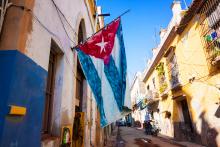
THOUGH SOME HAVE accepted “axis of evil” characterizations of Cuba and North Korea, my experiences of the two countries—nine visits to Cuba and one week in North Korea—have led me to far different conclusions: There are very few similarities between the two nations, and neither is inherently “evil.”
Music infuses the air in Cuba as in no other of the 60 countries to which I’ve traveled. The streets are alive. Children play baseball and soccer in the streets. Cafes, parks, and other public places are crowded and noisy. Nearly everyone I’ve met has treated me like a long-lost friend, even more so when they learn I’m American. There is a natural affinity between Cubans and Americans. More than 100 flights a week ferry people between Havana and Miami.
In North Korea, the streets are eerily quiet. There is virtually no visible human interaction. North Koreans are forbidden to make eye contact with Westerners. There appear to be no public gathering places except the massive government plazas where military parades and government rallies are staged. I was never allowed to go anywhere without a “minder.” I traveled with a Presbyterian Church (U.S.A.) official who was born in North Korea and returns there frequently. His counsel: “Assume that everywhere you go you are followed and that every conversation you have, no matter where, is bugged.” His relatives received permission to travel from their home village to Pyongyang to visit him. In our hotel room, he turned the television volume up to full blast before they began talking quietly. On one early morning walk near our hotel (the only time I was unescorted), I took a few photographs. By the time I returned to the hotel, government representatives were waiting in the lobby, demanding to see all my photos and instructing me on which ones to delete.


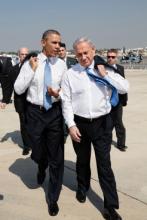
American Jewish leaders and activists are worried about widening political divisions between Israel and the White House, sparked by Israeli Prime Minister Benjamin Netanyahu’s controversial address to Congress on Tuesday despite strident objections by President Obama.
Many are concerned about the threat to Israel from Iran’s nuclear program and the prospect of a weak deal with the United States to curb it, an issue on which Netanyahu has been an outspoken Obama critic. Even so, they believe Netanyahu’s unrestrained attacks on the White House and in-your-face visit jeopardizes the close ties Israel has long enjoyed with the United States.
“People are upset about it,” said Rob Eshman, publisher and editor in chief of the Jewish Journal, a Los Angeles-based publication and website.
“They’re obviously concerned about Iran and want a good deal and think it’s really unfortunate that Prime Minister Netanyahu is doing this — creating a conflict outside the existing conflict.”
The divisiveness among Americans mirrors that of many Israelis equally concerned the visit will plunge traditionally close relations between U.S. and Israeli leaders to an unprecedented low.

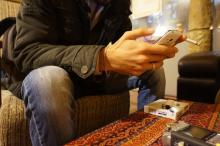
Hassan, a chain-smoking 20-year-old from Syria, sits in a cafe across the border from his homeland, one of thousands who escaped the clutches of the Islamic State group.
Not so long ago, he was one of their recruits, having undergone four months of religion training where he learned how to pray and read the Quran, while at the same time patrolling the rebel stronghold’s checkpoints.
“We loved them so much,” said Hassan, who was not willing to be identified by his real name for fear of retribution against family members still in Syria. “They gave us so much information and taught us very sweet things about Islam.”
But then things started to change.
As the Islamic State group grew in power, he saw more orders to target members of other widely popular Sunni rebel groups. At checkpoints, Hassan said, recruits were commanded to arrest or kill any members affiliated with the Free Syrian Army, an umbrella of rebel groups that he and his family supported.
His mother, who was growing increasingly disgruntled with the Islamic State’s strict rules, confronted him. “‘Why are you doing this?'” he said she told him. ‘”This is wrong.'”
It wasn’t long after, as intense fighting broke out with another Islamist brigade, Ahrar ash-Sham, that Hassan decided to stop fighting for the Islamic State.

